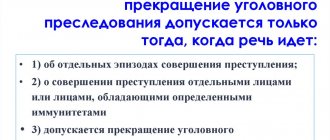Criminal Code of the Russian Federation in the latest edition:
Article 158 of the Criminal Code of the Russian Federation. Theft
1. Theft, that is, the secret theft of someone else’s property, -
shall be punishable by a fine in the amount of up to eighty thousand rubles, or in the amount of the wages or other income of the convicted person for a period of up to six months, or by compulsory labor for a term of up to three hundred sixty hours, or by corrective labor for a term of up to one year, or by restriction of liberty for a term of up to two years. , or forced labor for a term of up to two years, or arrest for a term of up to four months, or imprisonment for a term of up to two years.
2. Theft committed:
a) by a group of persons by prior conspiracy;
b) with illegal entry into the premises or other storage;
c) causing significant damage to a citizen;
d) from clothes, bags or other hand luggage that were with the victim -
shall be punishable by a fine in the amount of up to two hundred thousand rubles, or in the amount of the wages or other income of the convicted person for a period of up to eighteen months, or by compulsory labor for a term of up to four hundred eighty hours, or by corrective labor for a term of up to two years, or by forced labor for a term of up to five years. with restriction of freedom for a term of up to one year or without it, or imprisonment for a term of up to five years with restriction of freedom for a term of up to one year or without it.
3. Theft committed:
a) with illegal entry into a home;
b) from an oil pipeline, oil product pipeline, gas pipeline;
c) on a large scale;
d) from a bank account, as well as in relation to electronic money (in the absence of signs of a crime provided for in Article 159.3 of this Code) -
shall be punishable by a fine in the amount of one hundred thousand to five hundred thousand rubles, or in the amount of the wages or other income of the convicted person for a period of one to three years, or by forced labor for a term of up to five years with or without restriction of freedom for a term of up to one and a half years, or imprisonment for a term of up to six years with a fine in the amount of up to eighty thousand rubles or in the amount of the wages or other income of the convicted person for a period of up to six months or without it and with restriction of freedom for a term of up to one and a half years or without it.
4. Theft committed:
a) an organized group;
b) on an especially large scale, -
shall be punishable by imprisonment for a term of up to ten years with or without a fine in the amount of up to one million rubles or in the amount of the wages or other income of the convicted person for a period of up to five years and with or without restriction of freedom for a term of up to two years.
Notes. 1. In the articles of this Code, theft refers to the illegal gratuitous seizure and (or) conversion of someone else’s property for the benefit of the perpetrator or other persons, committed for mercenary purposes, causing damage to the owner or other holder of this property.
2. Significant damage to a citizen in the articles of this chapter, with the exception of part five of Article 159, is determined taking into account his property status, but cannot be less than five thousand rubles.
3. In the articles of this chapter, premises are understood as buildings and structures, regardless of the form of ownership, intended for the temporary residence of people or the placement of material assets for production or other official purposes.
In the articles of this chapter, storage means utility premises separated from residential buildings, areas of territory, pipelines, and other structures, regardless of the form of ownership, that are intended for permanent or temporary storage of material assets.
4. In the articles of this chapter, with the exception of parts six and seven of Article 159, Articles 159.1 and 159.5, large size is recognized as the value of property exceeding two hundred and fifty thousand rubles, and especially large - one million rubles.
Return to the table of contents of the document: Criminal Code of the Russian Federation in the latest edition
Concept, signs and subject of theft
The concept of theft is given in Appendix 1 to Article 158 of the Criminal Code of the Russian Federation.
The main object of the crimes included in Chapter 21 of the Criminal Code of the Russian Federation should be considered property relations in the broad, economic sense of the term. The essence of these relations is determined by their object - they develop regarding the appropriation and circulation of material (more precisely, property, i.e. valued in money) benefits. In the terminology of civil law, these relations are called property relations.
The subject of theft may be someone else's property, but not any property listed in Art. 128 of the Civil Code of the Russian Federation, can be the subject of theft, but only if it has three characteristics: real, economic and legal.
1) Property sign
The material attribute of property as the subject of theft presupposes that the property as the subject of theft must have a certain physical form, i.e. its material substance can be perceived by the senses in the objective world.
Accordingly, cannot be the subject of theft :
- intellectual property and rights arising from it (Part IV of the Civil Code of the Russian Federation). On the one hand, encroachments on intellectual property form independent elements of crime (for example, Articles 146 - 147, 180 of the Criminal Code of the Russian Federation). On the other hand, the subject of theft may be things in which intellectual property is embodied (for example, manuscripts, cassettes, disks, etc.), however, in order to qualify as theft, such items must be stolen solely for their own sake, and not for the sake of what is recorded in them;
- information , attacks on which may in some cases be qualified under Art. Art. 183, 272, 275, 276 of the Criminal Code of the Russian Federation;
- water, gas, thermal, electric and other types of energy , as well as radio services, telephone services and Internet services provided to consumers, the unlawful use of which should be qualified under Art. 165 of the Criminal Code of the Russian Federation;
- so-called legitimation signs , i.e. numbered tokens of wardrobes and storage rooms, other signs certifying the acceptance of things for storage, bank client cards, etc., as well as documents granting the right to receive someone else's property, but not being securities (for example, documents for access to bank safe, pawnshop receipts). The theft of these items should be classified as preparation for fraud.
May be subject to theft:
- things (both movable and immovable). At the same time, immovable things can be the subject of theft both if these things are immovable by force of law (aircraft and sea vessels, inland navigation vessels, etc.), when all forms of theft are possible in relation to them, and if if these things are immovable due to their nature (in this situation only fraud is possible). If property that is immovable by nature can be turned into movable property (for example, by dismantling a house into logs), then all forms of theft are possible;
- money in any currency, but at the same time being cash and genuine;
- securities;
- so-called money surrogates , i.e. bearer documents that act as a monetary equivalent when paying for certain goods, works or services: coupons for fuel and lubricants, subscription books, travel tickets and coupons, payment tokens, postage signs.
2) Economic sign
The economic attribute of property as a subject of theft suggests that it can only be something that has objective economic value.
3) Legal attribute
The legal attribute of property as the subject of theft presupposes, firstly, that it is not withdrawn from free civil circulation and has limited negotiability (Article 129 of the Civil Code of the Russian Federation) and, secondly, that it is alien to the perpetrator in the legal sense.
The theft of objects withdrawn from circulation and of limited circulation is, as a rule, provided for by special provisions of the criminal law (for example, Article 221 of the Criminal Code of the Russian Federation “Theft or extortion of nuclear materials or radioactive substances”, 226 of the Criminal Code of the Russian Federation “Theft or extortion of weapons, ammunition, explosives and explosive devices", 229 of the Criminal Code of the Russian Federation "Theft or extortion of narcotic drugs or psychotropic substances, as well as plants containing narcotic drugs or psychotropic substances, or their parts containing narcotic drugs or psychotropic substances", 325 of the Criminal Code of the Russian Federation "Theft or damage to documents, stamps , seals or theft of excise stamps, special stamps or marks of conformity"), and only in the absence of such a special norm the theft of the relevant items can be qualified according to the norms of Chapter. 21 of the Criminal Code of the Russian Federation.
The second element of the legal property property presupposes that the property is alien , i.e. is in the actual possession of another person at the time of theft and does not belong to the thief by right of ownership. The actual possession of another person does not necessarily require legal title to this property: therefore, it is possible to steal an item that has already been stolen.
Encroachment on one's own things or rights, or those whose ownership of a given subject is disputed, does not constitute theft, but may entail liability for arbitrariness (Article 330 of the Criminal Code of the Russian Federation, Article 19.1 of the Code of Administrative Offenses of the Russian Federation).
What is a completed illegal act?
Theft does not become a complete crime at the moment of seizure of valuable items or money. The purpose of theft is not simply to take away valuables, but to obtain benefits for oneself or third parties. Therefore, a crime such as theft is considered completed after the thief has not only acquired the property, but can also freely dispose of it , for example, sell, donate, or independently use things or money as his own.
For example, a person decided to steal a chocolate bar from a supermarket. He, secretly so that he would not be visible on the cameras, hid it in a bag, hid behind a rack where no one could see him, and ate his prey. At the exit from the store, a security guard stopped him and showed him a recording of the attacker eating a chocolate bar (the thief did not notice the camera in this part of the store). This case is theft, because... the attacker managed to dispose of the stolen property.
Another example. Early morning. Rush hour in the subway, crush. The girl runs into a crowded carriage. She finds herself sandwiched between two men. There is a phone in the back pocket of her jeans that she forgot to move. It is difficult to turn around or even raise your hand in such a situation.
At the next station, passengers begin to disembark, squeezing between each other towards the exit. One of the passengers, getting out, passes by the girl, notices the phone in her pocket and quietly pulls it out. Doors are closing. The criminal goes about his business unnoticed. A classic pickpocket has been committed (read here what to do if you are faced with a similar situation and your phone was stolen).
Things left unattended by their owners in places such as a train station, airport, etc. are in the possession of citizens who are their owners.
For example, a man arrives on a night flight, leaves his luggage at night in a half-empty airport and goes to the toilet. At this time, another passenger, who liked the expensive, lonely suitcase, is walking through the arrivals area to the exit. The attacker appropriates it, opens it, takes out valuables, quickly walks through the airport to the exit and leaves. Taking possession of valuables will be considered theft.
Signs of theft
The objective side of theft includes:
- act - illegal gratuitous seizure and (or) circulation of someone else's property in favor of the offender or other persons;
- consequences - causing property damage to the owner or other owner of the property;
- causal relationship between the act and the consequences.
Seizure should be understood as the extraction (exclusion, removal, withdrawal) of property from the possession of the owner or another owner, and circulation - as the transfer (entry, transfer) of property into the illegal actual possession of another person.
The illegality of seizure and treatment presupposes that the perpetrator has no actual or perceived right to the stolen property. A conscientious mistake in the presence of such a right excludes liability for theft and may, if there are grounds for this, be qualified under Art. 330 of the Criminal Code of the Russian Federation.
Gratuitousness occurs in the absence of adequate compensation for the value of the seized property. It should be taken into account that the presence of adequate (equivalent) compensation in itself does not transform an unlawful seizure and (or) treatment into a lawful one. Simply, in the presence of such compensation, there is no element of theft, which does not exclude the classification of the offense under other articles of the Criminal Code of the Russian Federation (for example, under Articles 330, 285, 286 of the Criminal Code of the Russian Federation). Gratuitousness should be understood as the absence of full compensation for stolen property. Partial compensation for stolen property does not exclude criminal liability.
The circulation of property in favor of a guilty person or another person in the concept of theft means ensuring the actual ability of these persons to own, use and dispose of someone else’s property as their own. Thus, the selfish goal of theft is realized. Temporary borrowing of money and temporary possession and use of other things are not considered theft, but entail liability, for example, for unlawful taking of a car (Article 166 of the Criminal Code of the Russian Federation), for causing property damage by deception or abuse of trust (Article 165 of the Criminal Code of the Russian Federation) , for abuse of power (Article 202 or 285 of the Criminal Code of the Russian Federation). The theft of property solely for the purpose of its destruction (damage) cannot be considered as theft, since it does not bring any direct benefit to the perpetrator or other persons. Indirect benefit (even if associated with a selfish motive) (for example, killing a competitor’s racehorse after theft) cannot indicate theft.
Causing damage . The law, in defining the concept of theft, directly refers to causing damage to the owner or other possessor of property. However, it is not stated that ownership of property must necessarily be legal. This should be understood in the sense that property that is in unlawful possession, including stolen property, can also be stolen.
The subjective side of theft (Articles 158 - 162 of the Criminal Code of the Russian Federation) is characterized by direct intent and a selfish motive, implying the desire of the perpetrator to enrich himself or to enrich other persons in whose enrichment he is interested (relatives, friends, creditors of the perpetrator, his accomplices in the commission of a crime, etc.). P.). Accordingly, as already mentioned above, there are no signs of theft in cases of so-called temporary borrowing, when property is withdrawn for a while and then returned.
What to do if your apartment is broken into/robbed?
If you are not spared by such an event as theft from your home, you first need to act as follows.
- Try to carefully, so as not to destroy possible remaining traces of the criminals, inspect the premises into which there was penetration in order to establish a complete list of the stolen items.
- After this you need to call the police.
You need to contact the nearest police department serving the area where you live. There is no need to visit the police in person; the application can be made by telephone.
Step 1. Inspection of the scene of the incident and drawing up a protocol
After making a telephone message, you need to wait for the employees to arrive and provide them with your home for inspection. Based on the results of the inspection, a protocol of the same name will be drawn up.
obrazec_protokola_osmotra_mesta_proisshestvija
Before the inspection begins, the owner of the premises or the person currently living in it must legally give written permission to conduct it.
Before the arrival of the police task force, try to remember the signs of the stolen property (shape, weight of gold items, scratches on the body of the equipment, color of fur coat, size of clothing, cash bills, etc.) in order to create as accurate a description as possible. Make a preliminary assessment of the stolen property.
All this is necessary for the further search for your property.
Step 2. Writing a report of theft to the police
Upon the arrival of the police, the investigator or the person conducting the inquiry will ask you to write a statement about the fact of theft, immediately at your home, or will invite you to testify and draw up a statement at the police department.
The application is drawn up on the prescribed form or in free form. There are no strict requirements for its form.
As a rule it is indicated:
- addressee - the head of the police department of your area, indicating the full name, position and rank of the official;
- applicant - your full name, residential address;
- a list of stolen goods indicating the preliminary cost and amount of property damage caused to you;
- a request is made for the need to search for the stolen person and the unknown persons who committed the theft;
- applicant's signature and current date.
obrazec-zayavleniya-v-policiyu-o-krazhe
Usually police officials tell you in detail how and what to write, and no difficulties arise with this. If they don't help you, stick to the form suggested above.
The times when law enforcement officers did not register accepted applications or refused to accept them, citing some circumstances, are long gone.
But nevertheless, you need to know that according to the police regulations, after accepting the application, you must be given a numbered notification coupon , which contains information about the acceptance of the application, the official who accepted it, the number and the current date. If you have not received a ticket, your rights have been violated.
Step 3: Consideration of the burglary report
The Russian Criminal Procedure Legislation sets a period of 3-10 days ; in exceptional cases, this period can be extended, but not more than 30 days .
Within the specified time frame, the application submitted by you must be considered and a decision made:
- to initiate a criminal case;
- refusal to initiate criminal proceedings;
- about sending an application by territoriality (if you applied to a police department that does not serve your address territorially).
As you can see, the list is not so long. To issue a decision to refuse to initiate a criminal case, police officers need very compelling reasons. In cases of theft of other people's property, this is, as a rule, an underestimation of the stolen property.
7(800) 350-23-68
Dmitry Konstantinovich
Expert of the site "Legal Consultant"
Ask a Question
2,500 rubles is the required amount for the assessment of the stolen property to recognize the theft as having taken place at the present time. When committing qualified theft, which includes theft from premises and especially from a home, this amount may be less. The main thing is that it does not fall under the concept of insignificance , which is regulated by Article 14 of the Criminal Code of the Russian Federation.
And if the amount is significantly more than the specified amount, a criminal case will definitely be initiated, and you will definitely be notified about it.
An assessment of the stolen property, based on your testimony, is done in specialized institutions at the request of the police . If you do not agree with this assessment, you can order an assessment from a similar company yourself.
If any difficulties or controversial issues arise with the registration and consideration of your application, you can seek help from a criminal lawyer. On our website you can ask any question on this topic absolutely free.
Forms and types of theft
According to the method of committing, theft is divided into 6 forms: secret (theft), open (robbery), by deception or abuse of trust (fraud), by attack combined with violence dangerous to life or health, or with the threat of such violence (robbery) , theft of entrusted property through misappropriation or embezzlement. Fraud, in turn, has 6 special types associated with additional methods or scope of commission (Part 5 of Article 159, Articles 159.1 - 159.6 of the Criminal Code of the Russian Federation).
Types of theft are distinguished depending on the size of the theft, determined by the value of the stolen property at the time of the crime. According to this criterion, the law distinguishes petty theft, “simple”, large-scale and especially large-scale theft.
Petty theft is provided for in Art. 7.27 Code of Administrative Offenses of the Russian Federation and Art. 158.1 of the Criminal Code of the Russian Federation. Petty theft does not include robbery and robbery, as well as all other forms of theft if they were committed under qualifying circumstances.
Part 1 of Art. 7.27 of the Code of Administrative Offenses of the Russian Federation provides for petty theft of someone else’s property, the value of which does not exceed 1,000 rubles, through theft, fraud, misappropriation or embezzlement; Part 2 of this article, under the same conditions, increases liability for theft of property worth more than 1,000, but not more than 2,500 rubles.
As a crime (Article 158.1 of the Criminal Code of the Russian Federation), petty theft of someone else’s property committed by a person subjected to administrative punishment for petty theft, provided for in Part 2 of Art. 7.27 Code of Administrative Offenses of the Russian Federation.
Theft on a large scale (qualified type) is committed in an amount exceeding 250,000 rubles, and on an especially large scale - exceeding 1,000,000 rubles (note 4 to Article 158 of the Criminal Code of the Russian Federation).
A special type of theft is theft that caused significant damage to a citizen (qualified type of theft, fraud, misappropriation and embezzlement). In this case, the victim is only an individual, the value of the stolen property must exceed 5,000 rubles, and the significance of the damage is determined taking into account the property status of the victim (note 2 to Article 158 of the Criminal Code of the Russian Federation).
What is considered an assassination attempt?
Attempted theft, following from the above, is a situation where the offender did not have time to use the stolen valuables for his own benefit.
Consider the first example, where an attacker steals a chocolate bar from a store. The subject is very hungry, he still secretly hides the chocolate in his pocket so that he is not visible on the cameras. While leaving the supermarket, the subject walks through a detector frame and it goes off.
A security guard stops a man and asks him to empty his pockets. The culprit takes a chocolate bar out of his pocket and confesses that he stole it from the store. This case will be recognized as attempted theft, because... the circumstances that prevented the completion of the crime did not depend on the offender; he was stopped by a security guard, and did not have time to use the stolen goods for his own purposes.
The second example of a completed mobile phone theft may only become an attempt. In case a young man who stole a phone, for example, got stuck in the closing doors, and the girl noticed the loss and snatched the phone from his hands. Then the attacker will not have time to use the stolen item and the crime will be an attempted theft.
Our third example with the theft of a suitcase at the airport can also become an attempted theft. A man leaves his luggage at night in a half-empty airport and goes to the toilet. At this time, another passenger is walking through the arrivals area towards the exit, whose attention is attracted by an expensive, lonely suitcase.
The attacker appropriates it and rolls it along the airport. At this moment, a passenger sitting nearby, who had previously seen the owner of a noticeable suitcase, wakes up and notices that the suitcase is in the hands of a completely different person. He reprimands the criminal, threatening to contact airport security. The attacker runs to the exit.
In this case, the offender attempted theft, because he had to leave the suitcase due to accidental circumstances. He did not have time to use the property in the suitcase.
In special publications, our experts tell how the crime will be classified and what is the responsibility for it if a theft has been committed:
- weapons and ammunition;
- budget funds and state property;
- documents and money.






